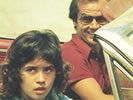Eye For Film >> Movies >> The Passenger (1975) Film Review
Once, when driving through the Arizona-California desert many years ago, I suffered severe stomach cramps and dry retching. I was on my own. The thought occurred to me that I was the only person I could rely on to get me to the other side. I couldn't pull in to a service station, phone an ambulance or even a friend. My name, credit cards, money - nothing meant anything really. A small experience, but it was one of a number that helped shape my life. My sense of 'I'. Devoid of description, or my 'place' as defined by language, country or custom. And I suspect many of us have at one time or another pondered a similar mystery of identity, each in our own way. An essential element that makes us who we are.
I remembered that incident because David Locke, in this film, is also in a desert. And in typical Anotonioni style, the film asks questions about identity. He is a journalist. Originally it was about making a documentary on some guerrilla movement in Africa. But he is also a man who may be fleeing from himself. Or at least from the world as it is. Locke is played by a young Jack Nicholson, in one of the finest performances of his career. And we don't know much about him.

There is hardly any dialogue for a long time. No contrived situations or script to fill us in on who he is. There is nothing surreal about the narrative, yet still we have to project our own ideas about the character onto him: his background, his destiny.
Locke gets through the desert to a hotel. In the next room, he discovers a man of similar age, weight and so on called Robertson, who has just died. With no explanation, Locke switches identities with this man, taking his passport and pulling together threads of his life as they become apparent (just as we are doing with Locke).
The main other person in this film, played by Maria Schneider, is a girl he meets on his travels. She is young, a student. She takes it upon herself to accompany him. In spite of her age, she is a strong woman with a clear mind of her own and in control of her choices. But she is also a puzzle.
The French philosopher Gilles Deleuze said of the director's work as embodied in this film that "the characters were objectively emptied: they are suffering less from the absence of another than from their absence from themselves."
The Passenger is fascinating not only in its story (enriched no doubt by scriptwriter Peter Wollen's experience as a political journalist abroad) and the way it treats its subjects, but in its editing and cinematography. Standard editing in American cinema demands a cut after each climax. There is usually a build-up within a scene, a culmination, and then we cut to the next scene. The Passenger is a striking example of a very different approach, where the key event doesn't end the shot. Cumulatively, it creates a hypnotic, contemplative effect in the viewer, which reaches its peak in a long (seven minute), majestic shot where the camera tracks up to and then through a window. Our conception of David Locke is internalised. His image has been left behind. We are shown trivial details - anything except the visual reality of him. The shot is maintained long after the climax.
The Passenger is not an easy film, but it is one that lingers in the memory. Unlike Antonioni's more famous English-language film, Blow-Up (which now looks very dated), it doesn't seem to age. If nothing else, The Passenger confirms Antonioni's place (in the words of the Academy in giving him an honorary Oscar), as one of cinema's 'master visual stylists'. Antonioni himself said he considered it his "most stylistically mature film," and added "I also consider it a political film as it is topical and fits with the dramatic rapport of the individual in today's society."
Like any great movie, The Passenger leaves the viewer with many ideas to savour and ponder.
Reviewed on: 02 Oct 2007



















